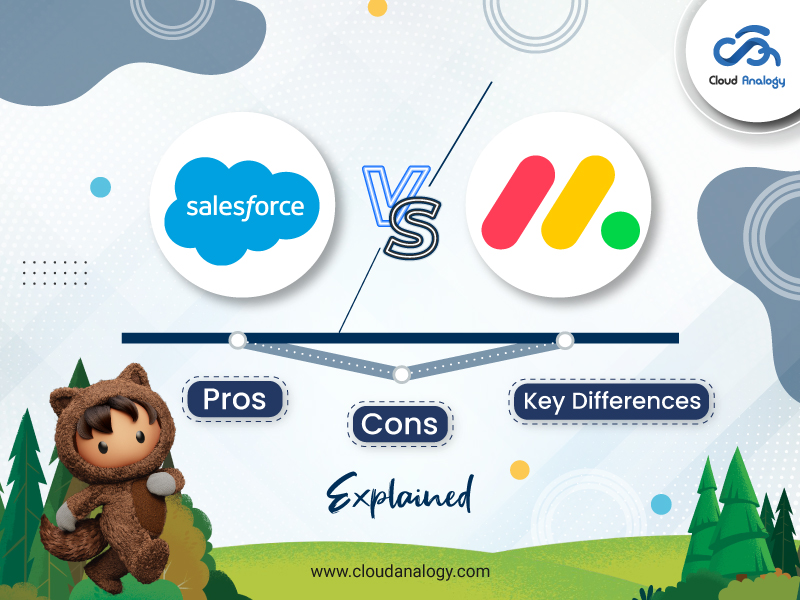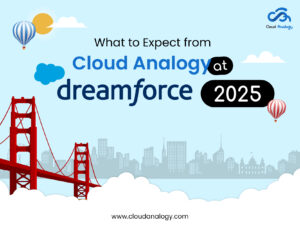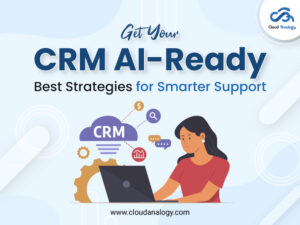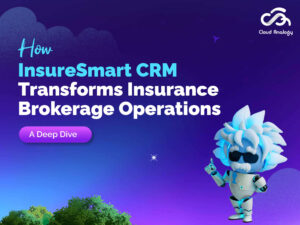Running a business without a CRM is like flying a plane blindfolded — you might stay in the air for a while, but you’re bound to hit turbulence.
No wonder, gone are the days when a CRM was a “nice-to-have.” Whether you’re a startup or a global enterprise, CRM tools empower your teams to personalize interactions, anticipate customer needs, and ultimately boost sales and loyalty.
CRM (Customer Relationship Management) software has become the control tower of modern business operations. It consolidates customer data, streamlines communications, boosts team productivity, and drives smarter, data-led decisions.
Among the top players in this space are Salesforce Sales Cloud & monday Sales CRM—two robust platforms designed to enhance customer engagement and business performance.
While both offer a 360-degree view of the customer journey, their pricing, features, and usability differ significantly. Let’s break down the pros, cons, and key differences to help you choose the right CRM for your business.
Salesforce vs. monday.com: Quick Overview
1. Starting Price
- Salesforce Sales Cloud: Starts at $25/user/month
- monday Sales CRM: Starts at $9/user/month (with a 3-seat minimum)
Result: Getting started with monday is more budget-friendly for small teams.
2. Sales Forecasting
Salesforce: Available in Pro and higher plans
monday.com: Included in Pro and Enterprise plans
Result: Both platforms offer forecasting, but access to this feature depends on the plan tier.
3. App Integrations
Salesforce: Offers 4,000+ integrations via AppExchange
monday.com: Supports 200+ integrations
Result: Salesforce leads in ecosystem depth, while monday covers most essentials.
4. Automation Capabilities
Salesforce: Advanced, customizable flows starting with 5 flows
monday.com: 250+ actions/month in the Standard plan
Result: Salesforce offers deeper automation; monday is simpler and easier to deploy.
5. AI Features
Salesforce: Einstein AI is available in top-tier plans
monday.com: AI in beta, accessible via opt-in
Result: Salesforce has mature AI tools; monday is still testing the waters.
6. Ease of Use
Salesforce: Robust but complex, requires technical know-how
monday.com: Beginner-friendly with an intuitive interface
Result: Choose monday for ease of use, or Salesforce for scalability and customization.
Who Should Use Salesforce Sales Cloud?
Best for: Medium-to-large enterprises with complex processes, large data volumes, or industry-specific needs.
Salesforce is like a fully equipped rocket ship — it takes time and expertise to launch, but once it’s airborne, the performance is unmatched. With deep customizations, enterprise-grade security, and scalable architecture, Salesforce is ideal for organizations with advanced CRM needs and dedicated admin resources.
Pros:
- Extensive integrations and customizations
- AI-driven insights with Einstein
- Advanced analytics and reporting
- Ideal for scalability and growth
Cons:
- Higher cost, especially for AI features
- Steep learning curve
- Requires ongoing IT support
Who Should Use monday Sales CRM?
Best for: Startups, small to mid-sized businesses (SMBs), or departments seeking a quick, visual, and easy-to-use CRM solution.
monday is the agile sports car of CRMs — simple to handle, quick to deploy, and great for day-to-day operations. It helps teams track pipelines, automate repetitive tasks, and get started without requiring tech-savvy administrators.
Pros:
- Affordable pricing
- Extremely easy to use and set up
- Visual dashboards and workflow automation
- Good for cross-functional teams
Cons:
- Limited integrations compared to Salesforce
- AI features are still in beta
- Less suited for large-scale enterprise use
Pricing Breakdown
Salesforce Sales Cloud:
- Starter Suite: $25/user/month — Basic CRM functions
- Pro Suite: $100/user/month — Adds forecasting, automation
- Enterprise: $165/user/month — Adds AI, conversation insights
- Unlimited: $330/user/month — Full Salesforce features
- Einstein 1 Sales: $500/user/month — AI-first, data-unified solution
- Add-ons like CPQ, Revenue Intelligence, & Einstein can significantly increase costs.
monday Sales CRM:
- Basic: $9/user/month — Essentials like lead management and mobile access
- Standard: $12/user/month — Email sync, custom automation
- Pro: $19/user/month — Forecasting, analytics, mass emails
- Enterprise: Custom pricing — For larger teams needing advanced security
With monday, you must purchase at least 3 seats, but even the top-tier pricing remains accessible for most SMBs.
Feature Comparison
Salesforce Key Features:
- Part of the wider Salesforce ecosystem (e.g., Marketing Cloud)
- Highly customizable dashboards, fields, and objects
- AI assistant (Einstein) for predictions and insights
- Powerful reporting tools
- 4,000+ integrations via AppExchange
monday.com Key Features:
- Customizable boards & pipelines
- Built-in automation for reminders, emails, and task flows
- Two-way email sync and deal management tools
- Visual sales forecasting
- monday Academy for self-paced training
AI Capabilities
Salesforce Einstein: Einstein offers intelligent automation, predictive analytics, and sales insights. It can generate emails, summarize sales calls, and forecast deals. Advanced AI functions are available only with higher-tier plans or paid add-ons.
Monday AI: Still in beta, monday’s AI helps generate text, build formulas, and summarize information. It’s simple and useful for automating light tasks, but less robust than Salesforce’s AI capabilities.
Ease of Use
Salesforce:
- Powerful, but complex
- Requires setup, training, and sometimes developer involvement
- Steep learning curve, especially for custom automations
- Trailhead offers learning support, but implementation may need an expert
Monday.com:
- Beginner-friendly interface
- Can be deployed quickly without coding
- Ideal for teams that want to “plug-and-play”
- Training resources include monday Academy and video tutorials
Final Verdict: Which CRM Is Right for You?
Choose Salesforce Sales Cloud if:
- You’re a growing enterprise that needs scalability
- Your business relies on custom processes and advanced reporting
- You want deep integrations and cutting-edge AI
- You have or plan to hire dedicated Salesforce admins or consultants
Choose monday Sales CRM if:
- You’re a small or mid-sized team seeking a cost-effective CRM
- You need something easy to use and quick to set up
- You want visual dashboards and simple automation
- You prefer a budget-friendly, all-in-one platform with basic AI tools
Conclusion
CRM systems are at the heart of any successful customer strategy. Both Salesforce Sales Cloud and monday Sales CRM are excellent platforms, but serve different audiences.
- Salesforce is ideal for enterprises that require advanced functionality, scalability, and AI-powered insights.
- monday is perfect for startups and growing teams looking for simplicity, affordability, and quick implementation.
Choosing the right CRM depends on your company’s size, budget, goals, and technical resources. By evaluating your current pain points and future growth plans, you can make smarter decisions that drive real results.
Cloud Analogy, a trusted Salesforce summit consulting partner & Demo Jam winner at London’s Calling 2025, offers expert Salesforce consulting services tailored to your business needs. Whether you’re looking for scalable industry-based CRM solutions or ready-to-use Salesforce AppExchange products, we provide end-to-end support—from strategy to execution. Our innovative tools and custom solutions empower organizations to streamline workflows, boost productivity, and enhance customer engagement. Book your free consultation today and discover how Cloud Analogy, one of the leading Salesforce consulting companies, can help you harness the full potential of Salesforce to fuel long-term success.











